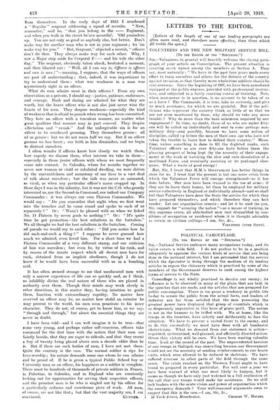LETTERS TO THE EDITOR.
[Letters of the length of one of our leading paragraphs arc often more read, and therefore more effective, than those which fill treble the space.]
VOLUNTEERS AND THE NEW MILITARY SERVICE BILL.
[TO THE EDITOR OF THE " SPECTATOR."] -
SIR,—Volunteers in general will heartily welcome the closing para- graph of your article on Conscription. The present situation is creating much unrest emong the members of Section A. They say, most naturally : " We have in the past four years made every effort to train ourselves and others for the defence of the country against invasion, so that thereby more whole-time soldiers should be sent overseas. Since the beginning of 1917, we have been armed and equipped at the public expense, provided with professional instruc- tors, and subjected to a fairly exacting course of training. Now, when man-power is in question, is no account to be taken of us as a force ? The Commands, it is true, take us seriously, and give us much assistance, for which we are grateful. But if the poli- ticians who represent the country think so little of us that we are not even mentioned by them, -why should we take any more trouble ? Why do more than the bare minimum required by our engagement ? In time, no doubt, those of us who are under fifty- one will be called up individually and sent to some perhaps non- military duty—and possibly, because we have some notion of discipline, called up before the men of their own age who have not taken the trouble to learn how to defend their country." Mean- time, unless something is done to fill the depleted ranks, such Volunteer officers as are over fifty-one have before them the pleasing prospect of being kept (by the necessity of their engage- ment) at the work of watching the slow and sure dissolution of a moribund Force, and eventually assisting at its prolonged obse- quies. What a waste of good energy !
But, Sir, I trust that R.M.'s Government has better things in store for us. I trust that the present is but one more crisis from which the Volunteer Force will emerge strengthened—as it has done before. Our men have been trained to the use of arms : if they are to leave their homes, let them be employed for military service collectively in England or individually abroad—and we shall feel that Volunteers have done the State the service for which they have prepared themselves, and which therefore they can best render. Let our organization remain : and let it be used (as you, Sir, suggest) for "arraying the nation "—as a means of training, in this supreme crisis, all able-bodied men (not disqualified by con- ditions of occupation or residence) whom it is thought advisable to retain in civilian callings.—I am, Sir, &c.,
VOLUNTEER (OVER SIXTY).


























 Previous page
Previous page